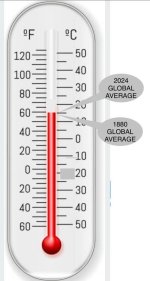A pile of bullshit will self combust.But…is it the hottest BULLSHIT on record?
It's Climate Change I tell'ya!! IT'S CLIMATE CHANGE!!
- Thread starter B00Mer
- Start date
You are using an out of date browser. It may not display this or other websites correctly.
You should upgrade or use an alternative browser.
You should upgrade or use an alternative browser.
Guess I better dump my used motor oil in the ditch then. Wouldn't want to be woke.The environmental movement has metamorphicized from people caring about the environment and pollution into a brainless Woke Doomsday cult.
Global warming happens every year come spring .There is no global warming.
Vaccines don't work.
Seatbelts don't save lives.
mnra shot’s are not vaccines
Following the rules of the road , save more .
Go for it, its not petroleum based any longer.Guess I better dump my used motor oil in the ditch then. Wouldn't want to be woke.
Synthetics. It a different concoction than motor oils of days gone by. Its biodegradable. Its still nasty but no long lasting effects.
Same goes for hydraulic fluid. The old school red petroleum shit is long gone.
That's exactly what I said. It's right there in the quote; you just have to read between the lines and add your own narrative.Guess I better dump my used motor oil in the ditch then. Wouldn't want to be woke.
If he wants to lube up a woke person in a ditch so be it. Just keep the kids away.That's exactly what I said. It's right there in the quote; you just have to read between the lines and add your own narrative.
Winter comes to a close as Canada’s warmest on record
Author of the article:Canadian Press
Canadian Press
Jordan Omstead
Published Mar 19, 2024 • 4 minute read
The warmest winter on record could have far-reaching effects on everything from wildfire season to erosion, climatologists say, while offering a preview of what the season could resemble in the not-so-distant future unless steps are taken to cut greenhouse gas emissions.
The warmest winter on record could have far-reaching effects on everything from wildfire season to erosion, climatologists say, while offering a preview of what the season could resemble in the not-so-distant future unless steps are taken to cut greenhouse gas emissions.
The warmest winter on record could have far-reaching effects on everything from wildfire season to erosion, climatologists say, while offering a preview of what the season could resemble in the not-so-distant future unless steps are taken to cut greenhouse gas emissions.
Winter comes to a close on Tuesday night — early Wednesday on Canada’s East Coast — with the arrival of the spring equinox. But climatologist David Phillips says it’s almost as if this winter in Canada never happened.
“I called it the lost season,” said Phillips, a senior climatologist with Environment and Climate Change Canada.
Canada shattered temperature records this winter, and it wasn’t close, Phillips said, referring to national data going back to 1948.
While winter’s end is typically marked by the equinox, climatologists look at what’s known as meteorological winter, the three-month period from December to February. Over that period, Canada was 5.2 C warmer than average, said Phillips. That’s 1.1 degrees warmer than the previous record set in 2009-2010.
There were bouts of extreme winter weather across Canada, from a January deep freeze on the Prairies to a massive snowfall in the Maritimes in February. But the warmer-than-normal and unusual weather was widely felt across the country.
This winter, Phillips said, “was put on hold — and not on ice.”
Some people may have been grateful for a break on heating bills or for periodic balmy days, but Phillips says the record-breaking temperatures upended Canada’s winter way of life. Winter festivals were cancelled, ski resorts faced closures, and flora and fauna emerged prematurely. Remote First Nations in Ontario and Manitoba that depend on ice roads issued states of emergency due to poor conditions.
Outdoor skating, often regarded as a picture-postcard image of Canada’s winter life, suffered too. Ottawa’s iconic Rideau Canal skateway was open for a few days this winter, after the previous year’s unprecedented season-long closure.
Damon Matthews, a Concordia University climate scientist who has tracked climate change’s impact on retreating rinks, cited Wayne Gretzky and Joni Mitchell as he noted the place of outdoor skating in Canada’s imaginings of winter.
Mitchell’s longing for a “river I could skate away on,” evoked in her 1971 song “River,” may be shared not just by those who decamped to California, but by people across Canada this year and in years to come, he said. Gretzky’s origin story of learning to play on outdoor rinks may be a story denied to other aspiring hockey players in southern Ontario.
“It’s a shame that’s the case,” he said.
Experts say the drivers of this winter’s record-breaking warmth include El Nino and human-caused climate change. Other related factors include record-high global ocean temperatures and residual heat from earlier in 2023.
El Nino, a natural climate phenomenon that typically comes around every two to seven years, was strong this year but not the strongest. The United Nation’s World Meteorological Organization said its peak fell short of at least two other El Nino winters in 1997 and 2015.
“El Nino has contributed to these record temperatures, but heat-trapping greenhouse gases are unequivocally the main culprit,” WMO Secretary-General Celeste Saulo said in an update earlier this month, referring to a string of consecutive global monthly temperature records.
Climate change is expected to crank up temperatures in winter more than any other season in Canada, said Phillips, the Environment Canada climatologist. If the world continues to emit greenhouse gases on a “business as usual” scale until 2050, Phillips says his own community of Barrie, in central Ontario, could see winters as warm as this one on a regular basis around 2065.
Less snow on the ground for the spring melt means less water available to irrigate farmlands and replenish reservoirs. As snow melts, it also helps to reduce the risk of wildfires.
Almost all of Western Canada, northern Ontario and parts of northern Quebec were under drought conditions as of the end of February, says a recent update from Environment Canada. Parts of southern Alberta and northern British Columbia reported conditions typically seen once every 50 years.
“The drought season, the forest fire season — these are all to come, but sometimes the seeds of those are sown in the winter,” said Phillips.
Great Lakes ice cover, which helps shield the shoreline from erosion during winter storms, also hit historic lows in February. Erosion concerns extend to coastal areas around the Gulf of St. Lawrence, including Prince Edward Island, said Phillips.
But there is a fine line between being clear about climate change’s consequences and despairing about a preventable outcome, said Matthews, the Concordia climate scientist.
“We need to get our act together and stop arguing about, as a country, whether this is even an issue or a priority,” he said, adding that Canada is “not stepping up the way we need to be.”
“Outdoor skating is a consequence of that, but at the same time, there are many, many worse things that will happen if we don’t get on with things.”

'THE LOST SEASON': Winter comes to a close as Canada’s warmest on record
Winter comes to a close on Tuesday night with the arrival of the spring equinox.torontosun.com

How was this even possible? Regina currently has a higher humidity than Akumal that’s right on the freaking ocean…

Even factoring in the 49°C temperature difference… which is like 120°F spread in temperatures. Idiots not from here will say, “At least it’s a dry cold!”

All part of the Great Big Global Conspira-ceee to DESTROY CANADA and turn the Men of Westernesse into Commie gay French-speaking SLAVES!
Are you sucking the glass dick?All part of the Great Big Global Conspira-ceee to DESTROY CANADA and turn the Men of Westernesse into Commie gay French-speaking SLAVES!
The Little Ice Age (LIA) was a period of cooling that lasted from the 16th to the 19th centuries, and the warming trend that began in the mid-19th century marked the end of the LIA. The sun was a major contributor to the warming that began in 1880, steadily increasing in temperature until the 1940s.
You mean. . . climate changes?The Little Ice Age (LIA) was a period of cooling that lasted from the 16th to the 19th centuries, and the warming trend that began in the mid-19th century marked the end of the LIA. The sun was a major contributor to the warming that began in 1880, steadily increasing in temperature until the 1940s.
I don’t know about that, but definitely some shrinkage out there today.All part of the Great Big Global Conspira-ceee to DESTROY CANADA and turn the Men of Westernesse into Commie gay French-speaking SLAVES!
If they start at a moyvin gloyvin anomalous low point and cry hoyvin glayvin the sky is falling because it rebounded isnt scientific.You mean. . . climate changes?
Global temperatures to rival 2024’s record-breaking heat: Climate officials
Author of the article:Canadian Press
Canadian Press
Jordan Omstead
Published Jan 15, 2025 • 2 minute read
This year’s average global temperature is expected to rival 2024’s record-breaking heat, Canadian officials said Wednesday, underlining humanity’s narrowing window to hit an international target intended to help avert some of climate change’s most serious effects.
“If you look at the scientific literature, the window is closing very rapidly,” said Bill Merryfield, a climate scientist with Environment and Climate Change Canada.
It’s expected to be 1.45 C warmer this year than it was in the late 19th century — and it’s virtually certain to be hotter than any year before 2023, the federal scientists said.
The forecast comes just days after 2024 was declared the warmest calendar year on record. The World Meteorological Organization said it beat out the previous record, in 2023, and surpassed the benchmark of 1.5 C warmer than pre-industrial temperatures for the first time.
Countries have agreed to try to keep the increase in temperature below the 1.5 C mark and well below 2 C over the long term in a bid to prevent some serious effects of human-caused climate change, driven by planet-warming fossil-fuel emissions.
The threshold is measured in decades, not a single year. So, while the threshold is not broken because of last year’s record, Merryfield warned: “We’re almost there.
“It would require reductions in emissions that are extremely rapid in order to avoid it, is what the current studies are showing.”
Scientists say every bit of warming matters and mitigation efforts are important whether or not the threshold has been breached. Even with warming below that proposed limit, Canada has acutely felt the impact of climate change as sea levels rise, heat waves intensify and wildfires worsen in severity.
The record warmth of 2023 and 2024 was boosted by El Nino, a climate pattern tied to shifting warm waters in the Pacific Ocean. This year’s forecast of rivalling warmth is expected to come despite the cooling influence of a weak La Nina, El Nino’s opposite.
While the forecast released Wednesday has a global scope, Merryfield indicated Canada’s average temperature was likely to be warmer than normal. Areas in the country’s northwest may be cooler than that because of the influence of La Nina in the first half of the year, he said.
Canada is warming about twice as fast as the global average, and the Arctic, in particular, is warming even faster.
— With files from The Associated Press.

 torontosun.com
torontosun.com
Author of the article:Canadian Press
Canadian Press
Jordan Omstead
Published Jan 15, 2025 • 2 minute read
This year’s average global temperature is expected to rival 2024’s record-breaking heat, Canadian officials said Wednesday, underlining humanity’s narrowing window to hit an international target intended to help avert some of climate change’s most serious effects.
“If you look at the scientific literature, the window is closing very rapidly,” said Bill Merryfield, a climate scientist with Environment and Climate Change Canada.
It’s expected to be 1.45 C warmer this year than it was in the late 19th century — and it’s virtually certain to be hotter than any year before 2023, the federal scientists said.
The forecast comes just days after 2024 was declared the warmest calendar year on record. The World Meteorological Organization said it beat out the previous record, in 2023, and surpassed the benchmark of 1.5 C warmer than pre-industrial temperatures for the first time.
Countries have agreed to try to keep the increase in temperature below the 1.5 C mark and well below 2 C over the long term in a bid to prevent some serious effects of human-caused climate change, driven by planet-warming fossil-fuel emissions.
The threshold is measured in decades, not a single year. So, while the threshold is not broken because of last year’s record, Merryfield warned: “We’re almost there.
“It would require reductions in emissions that are extremely rapid in order to avoid it, is what the current studies are showing.”
Scientists say every bit of warming matters and mitigation efforts are important whether or not the threshold has been breached. Even with warming below that proposed limit, Canada has acutely felt the impact of climate change as sea levels rise, heat waves intensify and wildfires worsen in severity.
The record warmth of 2023 and 2024 was boosted by El Nino, a climate pattern tied to shifting warm waters in the Pacific Ocean. This year’s forecast of rivalling warmth is expected to come despite the cooling influence of a weak La Nina, El Nino’s opposite.
While the forecast released Wednesday has a global scope, Merryfield indicated Canada’s average temperature was likely to be warmer than normal. Areas in the country’s northwest may be cooler than that because of the influence of La Nina in the first half of the year, he said.
Canada is warming about twice as fast as the global average, and the Arctic, in particular, is warming even faster.
— With files from The Associated Press.

Global temperatures to rival 2024’s record-breaking heat: Climate officials
This year's average global temperature is expected to rival 2024's record-breaking heat, Canadian officials said Wednesday.


